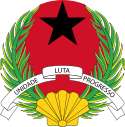1973 Portuguese Guinea Legislative Assembly election
 |
|---|
Elections to the Legislative Assembly were held for the first and only time in Portuguese Guinea in March 1973.
Background
[edit]A fifteen-member Legislative Council had been established in Portuguese Guinea in 1963. Most members were nominated by colonial authorities or business groups. A minority of its members were elected, but only a small proportion of the colony's population met the literacy and tax-paying requirements to register as a voter.[1]
On 2 May 1972 the Portuguese National Assembly passed the Organic Law for the Overseas Territories, which provided for greater autonomy for overseas territories.[2] The Legislative Council was converted into a Legislative Assembly, with number of members increased to 17, of which five were to be elected by direct suffrage.[2]
In late 1972 the African Party for the Independence of Guinea and Cape Verde (PAIGC) held indirect elections to a National Assembly in the eleven regions of the territory that it controlled, with voting not taking place in the four still controlled by Portuguese forces.
Results
[edit]Due to the restrictive conditions on registering to vote and more than half the country being under the control of the PAIGC, there were only 7,824 registered voters, less than 3% of the adult population.[1]
The elections were carried out on a non-party basis,[3] with 6,995 people casting votes, giving a voter turnout of 89.4%.[4]
References
[edit]- ^ a b Michael Cowen & Liisa Laakso (2002) Multi-party Elections in Africa, James Currey Publishers, p107
- ^ a b "Enactment of "Organic Law for the Overseas Territories". - Election of Legislative Assemblies and Consultative Councils in Overseas Territories". Keesing's Record of World Events. 19: 25948. June 1973.
- ^ Cowen & Laakso, p106
- ^ Cowen & Laakso, p108
